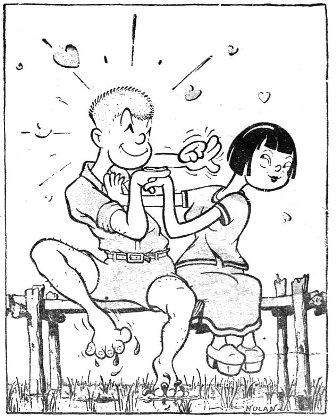
VOL. I NO. 26 REG. NO. L5015 DELHI, THURSDAY MARCH 11, 1943.
NEW CHINA AIR FORCE FORMED
|
The China Air Task Force yesterday became the 14th U.S. Air Force, according to an announcement from General Stilwell's headquarters in Chungking which arrived as the Roundup was about to go to press.
The new force, which brings two air forces to this theater, will remain under the command of Brig. Gen. Claire L. Chennault, organizer of the famous American Volunteer Group, former commanding officer of the China Air Task Force and considered by many to be one of the great air geniuses of this war.
The announcement came as a great surprise to the rank and file of this theater. According to the communique the activation came at the direction of the War Department and no further details were offered.
Japanese Won't Get Lull During Monsoon
The harassed Jap, who is licking his wounds in the matted Burma jungle, can expect no cessation of the relentless 10th Air Force offensive during the coming monsoon season, Brig. Gen. Clayton L. Bissell promised prophetically at his press conference, the first in two weeks.
The 10th Air Force commander announced that the monsoon had been anticipated for months and that all preparations have been made to carry on operations "as usual."
Bissell reviewed operations for February, in which the 10th Air Force conducted 70 missions against the enemy, knocking down 28 planes for a one-a-day record, probably sinking a 7,000-ton ship in the Gulf of Martaban and pounding troops, camps, vehicles, boats and stores.
Most of the 400 tons of bombs dropped upon the Jap came from the western side of the Hump, Bissell revealed, because adverse weather hampered the operations of China Air Task Force.
However, one of the most spectacular operations of the period was made by Maj. Grant Mahoney and his group. On Feb. 2, they surprised a Jap field and destroyed 11 out of 12 planes caught on the ground. The 12th they erased from the record the next day on a return mission.
Operations from India were equally successful, Bissell informed the press. The scoreboard on the repulsed Jap raids of Feb. 23 and 25, he announced now totals 14 confirmed and 14 probables.
The general told of how our aircraft attacked the Nipponese formations, breaking them up and dealing with individual planes in scattered running fights. For some of our pilots it was the first brush with the enemy and they conducted themselves admirably.
It will be with some difficulty that the heavily-jungled and wide-spread area over which the
|
He told of the lone American casualty in the Jap attack, 1st Lt. Cecil N. Vaccare, of South Greensburgh, Pa., and anti-aircraft officer. Vaccare abandoned his slit trench to warn a group of natives of their peril when a bomb fragment pierced his helmet and killed him instantly.
Bissell stressed two points in summing up the reasons for the Japs' utter failure. He praised the brilliant leadership of Col. Homer L. Saunders, who acted with conspicuous success both in the air and on the ground. Secondly, he lauded the teamwork displayed by American fighter units, anti-aircraft and air transport units. British anti-aircraft and ground forces, and the local Indian authorities and Indian people.
The 10th Air Force chief answered that 46 enemy aircraft participated in the Feb. 25 raid when a correspondent asked the question. He also revealed that so far there is no evidence to indicate reinforcement of Japanese aviation in Burma.
Whenever the RAF asks for assistance in the British operations in Arakan they will get it, remarked Bissell. He said that fullest cooperation will be given.
Hard To Get Into Sarge's Hair; Radio Man Comments On Love
By Corp. ROBERT WALSH
INDIA BOMBER BASE - It is getting rather difficult to get into the section chief's hair these days. Anyone who has seen M/Sgt. Bonneprise with his hat off can fully appreciate these words. Even with the gentle administrations of head messages by S/Sgt. Murphy, I fear that it is a bit too late. It is a nice head of skin that Bonney is raising.
On the hairy side, S/Sgt. Johnny Keyes made a masterful attempt at raising a cookie duster, but after several cutting remarks had been made by S/Sgt. Charlie Ballard, Johnny cut it off, then to his chagrin he had to call Ballard's attention to the fact that it was gone. No less than three days after the deed was done. That just ain't appreciation, is it Johnny?
Not being a drinker myself, my heart goes out to the man who misses the beer that we don't get here.
|
You don't have to be nuts to be a radio man, though as Charlie Ballard puts it, "Dadgum it, it sure helps a lot." Charlie claims that all we need up here is some good old fashioned loving, well I feel that a good meal would help a lot too. After looking over the stock in hand of loving around here, I think that a good meal is all we need.
We have a couple of aspiring candidates for OCS in our section in T/Sgt. Pinel and Sgt. Underwood, and to think all they sent was their name and rank, no coupons of any sort at all. Our prayers go with them, for it isn't everyone who can say "why I knew him when he was only an overpaid Tech."
Several of us heard S/Sgt. Murphy pass the remark that we didn't get enough exercise, though when the time came for a good-sized hole to be dug in the ground on our property, Murphy swore that we must have been having hallucinations.
Pets having been banished for the general health and protection of all concerned, it seems to be causing some little confusion. No one wants to shoot the favorite dog or monkey of his best friend, and there are so darn many of each breed running around that no one can remember which was which, so dilemma. Then, too, there is the shortage of shotgun shells with which the deeds are to be done, result, worse dilemma.
SQUADRON ENJOYS SHIN-DIG AT SWANK TEA PLANTATION
By Sgt. FRANCIS J. LAMBERT
ASSAM AIR BASE - The India-China wing of the Air Transport Command has become Delhi conscious. However, the battle of per diem is of minor importance to them. Their main incentive is to keep from becoming "Hump Happy." In their spare time (which by the way is very little) they have been active in sports, theatrical productions and cutting capers with the fair maidens and mistresses of the local tea plantations.
Yes fellows it all happened after one of the bright lads from the Ferry Squadron got a brainstorm. To be more explicit a shin-dig was held at a nearby planter's club and it was done in a "savoire faire" manner.
|
The entertainment committee, consisting of Corp. John (Chicken) Thomas, Corp. Douglas Fagan, Pfc. John (Mortician) Coffman, S/Sgt. Frank Strider and S/Sgt. Richard Robinson did a bang-up job of requisitioning (through proper channels) the hottest band this side of Per Diem Hill. None other than those "G.I. jivers" from the Engineer Battalion. The 15-piece band, under the direction of Warrant Officer Harry H. Hannebal, was loaned through the courtesy of the commanding officer of that organization.
Included on the entertainment program were several vocals by Sgt. Warren Shannon and a special jitterbug exhibition by Chicken Thomas and Douglas Fagan.
At intermission a delightful buffet lunch was served. It included sliced chicken which was edible in the inimitable Indian fashion and fudge that tasted like the kind mother made. To go with these mouth dropping teasers, the following were consumed in short order: cheese, pickles, hors d'oeuvres, rolls and coffee.
The members of the Ferry Squadron were deeply grateful to Mrs. B. J. Jones and to all the other hostesses, including members of the Red Cross, for making the evening a success. Official supervision was handled by Special Service Officer 2nd Lt. Paul C. Shebby. Among those present were Maj. Fletcher, Chaplain Garrenton, Chaplain Harrington, and Lt. Hanneman.
Airplanes, Like Women, Must Be Pampered
By T/SGT. WILLIAM P. LORD
CHINA AIR BASE - Airplanes are like women, some trim and sweet, others big, ugly, and
|
Capt. Clarence B. Dayton and 1st Lt. Lewis W. Bond are what might be called hospital superintendents, but tech orders call them engineering officers. From a Service Squadron come men who have to stretch their duties to include engine overhaul, prop shop, instrument shop, radio repair, base engineering, sheet metal shop, hydraulic shop, and all higher echelon activities necessary to "Keep 'Em Flying." To Dayton, Bond and those leathernecked assistants much credit is due for their job. They have worked like slaves to accomplish this task. Dayton and Bond had seen the war in Africa and knew what it would take to get the job done.
Pilots of the CATF swear by the power plants of their war birds and much credit for this faith can be given To S/Sgt. Jack Askew, the chief of engine overhaul. Askew, a set of tools and a sick Allison go together. No matter how good your power plant is, if the screw isn't in the groove, P-40's won't fly, and that is where T/Sgt. Eugene Lansing comes in.
A pilot's faith in his engine is equaled only by his faith in the instruments before him. With visibility zero, a slug of scrap iron through the radio, and gasoline low, the life of a pilot is only as good as his instruments. S/Sgt. William K. Ong is the man with the hands of a surgeon who can insure a pilot a long life.
Who hasn't been walking behind a woman and almost knocked her down when a fickle mind told her to stop. Airplanes have to stop the same way, too, and it takes a good hydraulic system to do it. Therein comes S/Sgt. Dudley E. Westlake.
When in combat, your buddy can't lean over the side of his cockpit and tell you a Zero is coming up on your tail, but by the grace of Marconi he can. Radios are the most contrary things on record. Tubes, condensers, resistors and a million things can go wrong. Corp. Ernest H. Phillips will fix.
Transport Pilots Save 20 Lives With Daring Crash-Landing
SOMEWHERE IN CHINA - With the gasoline supply exhausted, without flares to guide the ship, Capt. Albert C. Nowak and 1st Lt. William F. Gartman, Army Air Force transport pilots, ably crash-landed a Douglas cargo ship in a plowed field during a recent night flight without injury to any of the 16 passengers or four crew members.
Taking off at dusk from one of the dispersed airdromes of the CATF for an operations base, Capt. Nowak ran into ice formations at 13,000 feet. But being able to fly the ice, because of mountains, he climbed the ship to 21,000 feet. After two hours flying, he ran into a severe hail storm that pounded the ship, knocking out the radio compass. Passengers were thrown from one side of the cabin to the other, and when air pockets dropped the ship, heads hit the cabin roof.
ICE FORMS ON WINGS
Sgt. George R. Saylor was crew chief, and Sgt. J. F. Gannon was the radio operator. Both men are from Dayton, O.
During the long climb to high altitude, ice heavily overloaded the ship, consuming the limited fuel supply. With instruments gone, the ship almost iced over, and Nowak decided the best course would be to find a spot and set her down. Finding a hole in the overcast, they luckily spotted a plowed field for a crash landing.
Saylor opened the cabin door, told
|
TWO PASSES AT FIELD
The pilots made two passes to the field, carefully studying the terrain by landing lights. They made the landing run, slowing the plane to stalling speed with full flaps then turning off all lights and electrical equipment to prevent short circuits from setting the ship afire.
The big plane was inches above the ground when he cut the engine and let it settle. Sliding for 20 yards, it remained upright until the right wing hit a rock-pile, spinning the ship into an irrigation ditch.
They took a reconnaissance party to find communications in order to contact the base. After several hours a trail was found that led them to a village. Finding a telephone station of the Chinese Air Warning System, word was relayed to CATF headquarters. Arrangements were made with the local magistrate to transport the passengers to the base by truck. The crew remained with the wreckage.
AIR DEPOT BOYS PROVE THEIR ABILITY TO ANSWER FIRE CALL
By Corp. ROBERT WALSH
INDIA AIR DEPOT - A long, low bow is due in the direction of our QM truck company which single-handedly put out a fire which started in the vicinity of the ammunition storage at this air depot the other night. The boys did a swell job, and plaudits are in order.
There were less serious sides to the blaze, though. The inhabitants of the bay, in which M/Sgt. Cutsinger presides, were aroused as soon as the siren went off by a clarion-like call from his bed "Fire! Everybody up!" and then the sergeant made sure everybody did get up by striding up and down the aisle (in his shorts) repeating his summons.
Sgt. Shelby Evans, that well-known exponent of taking life easy, exhibited his usual speed by being the last one out of bed and outside. Pvt. Wood Painter, of the Finance Dept., got himself dressed and was outside of the barracks for at least 10 minutes before he completely woke up.
The "overhead" bay got a big kick out of the complete absence of any response from the Personnel Section barracks. But 1st Sgt. Tomlinson soon remedied that. His roars of "Fall out!" could be heard for miles. It was a gala occasion. Even the Ordnance got up.
Most of us who have been enjoying the music of Corp. Jimmie Richey's "Jive-Bombers" don't know that the instruments were provided by the American Red Cross for which many thanks.
AIR CORPS MEN GIVEN AWARDS
Thirty-two additional members of the C.B.I. Theater - 32 officers and two enlisted men - joined the number of Air Medal recipients. All members of the rapidly growing club are Air Corps personnel who have, say the citations, participated in more than 25 missions or engaged in over 100 hours of activity, all where exposure to enemy fire was probable and expected. The list:
Col. Emmett O'Donnell, Jr., Lt. Col. George Schatzel, Majs. Harry M. Pike and George W. Hazlett, Capts. John D. Lombard, Clyde B. Slocumb, Jr., Robert L. Liles, Robert E. Smith, and Edmun R. Goss, 1st Lts. Llewellyn H. Couch, Robert H. Mooney, Dallas A. Clinger, Jack R. Best, Robert A. O'Neill, William W. Druwing, Chester D. Griffen, Heath H. Wayne, Donald D. Bryant, George R. Barnes, Lucian N. Youngblood, and Lloyd J. Murphy, 2nd Lts. George V. Pyles, Lauren R. Barnebey, Melvin B. Kimball, Aaron Liepe, Lewis E. Hay, Walter S. Butler, Bernard A. Dyrland, Bill Wright, Rafari Ramirez, George W. Code, and Malcolm J. Milligan, and S/Sgts. Mac H. Isaacs and Marvin H. Riehl.
Chinese Women Help Outfit Alert Shacks
Chinese ladies representing the Committee of the National Women's Association and the War Area Service Corps paid a visit to the alert shacks of American squadrons based in China and presented the air corps enlisted men with lounge chairs, writing tables, and double-decker beds.
After visiting the alert shacks, the party adjourned to the new Airways Cafeteria, where Miss P. C. Chang, representing Madame Lung, chairman of the National Women's Association and wife of Gen. Lung Yun, Governor of Yunan Province, made a short speech which was interpreted for the Americans present by Mrs. Y. Y. Chu, wife of Mr. Y. Y. Chu, a Chinese missionary. Lt. Col. Bruce K. Holloway, commanding officer of the Fighter Group, then accepted the gifts on behalf of Brig. Gen. Claire L. Chennault.
 BY S/SGT. JACK NOLAN
BY S/SGT. JACK NOLAN

|

FLIGHT SURGEON'S LAMENT I'm one who wears amongst other things A staff with some snakes and a pair of wings. And one who swore that he would be Physician by the Oath of Hippocrates. I sympathize and say how sad Of those who are sick and are going mad. And tenderly I treat the hand That just got caught in the bolt of a Garand. By virtue of my Corps insignia I even console one with "Pilot Fatigue." But curses on thee, young and old Who come to me with a common cold. I'd tell them were I not so meek To keep on blowing and come back in a week. - ANONYMOUS |
|
"I'M OBFUSCATED" Where I should be so elated But instead I'm mitigated Over here I'm antiquated To tell the truth "I'm Obfuscated." Here in India I awaited Peace, but I got agitated With facts so unenumerated I don't know why "I'm Obfuscated." Maybe I should have propitiated For my thoughts so uneducated But then I would be prevaricated When at the moment "I'm Obfuscated." What is this phrase "I'm Obfuscated?" Maybe I should have elucidated But even if I expostulated That wouldn't explain, "I'm Obfuscated." - CORP. HENRY W. ASHER, JR. |
|
THAT'S WHERE INDIA BEGINS
Where the heat is a little dryer Where the gun is a little higher Where the hotels are a little colder And the buildings are a little older- That's where India begins. Where the 'cycles are a little rustier Where the trains are a little dustier Where the cows are a little holier And the desert is a little rollier- That's where India begins. Where the bazaars are a little gaudier Where the rich are a little haughtier Where the magazines are a little naughtier And the gharrywallahs are a little bawdier- That's where India begins. Where the nights are a little quieter Where the moon is a little whiter Where the handclasp is a little brighter- And the future is a little brighter That's where India begins. - SGT. HARRY A SKVIRSKY |
FREE EASTER MESSAGES HOME
The Chicago Tribune has requested the Roundup to announce that they will publish, without cost, Easter greetings for officers and men of this theater whose homes are in the middle western United States. If you desire publication of your message, follow these steps:
1. Use a typewriter if possible or print in block letters your name as well as the full name and address of the person for whom the greeting is intended.
2. Send in your messages as soon as possible to Alex Small, %Roundup, Rear Echelon Headquarters, USAF, CBI, New Delhi. The messages will be cabled to Chicago and must reach there before April 15. Don't wait until the last minute.
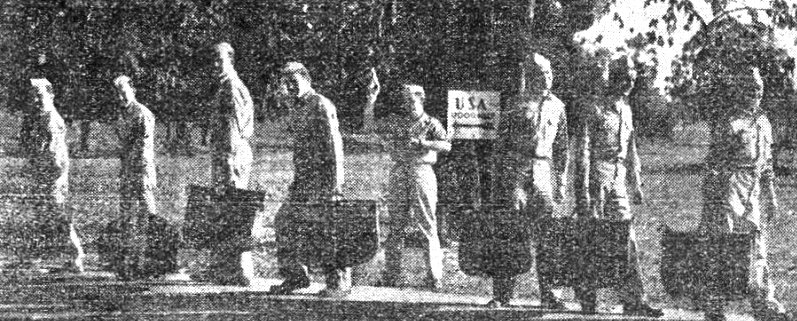 Full of hope, but without official conformation, are these seven non-coms who have been recommended for Officers'
Candidate School and a trip to the States by the selection board at an advance combat base in India. They're all packed,
just in case. Left to right: Sgt. Jack D. Underwood, Corp. Charles W. Erdlitz, T/Sgt. Robert A. Kohl, T/Sgt. Claude J.
Pinelli, 1st/Sgt. Richard C. Babb, T/Sgt. Bob E. Ralston, and T/Sgt. Earl C. Palmer. Capt. R. O. Nelson, Group Adjutant,
stands ready to give the starting signal.
Full of hope, but without official conformation, are these seven non-coms who have been recommended for Officers'
Candidate School and a trip to the States by the selection board at an advance combat base in India. They're all packed,
just in case. Left to right: Sgt. Jack D. Underwood, Corp. Charles W. Erdlitz, T/Sgt. Robert A. Kohl, T/Sgt. Claude J.
Pinelli, 1st/Sgt. Richard C. Babb, T/Sgt. Bob E. Ralston, and T/Sgt. Earl C. Palmer. Capt. R. O. Nelson, Group Adjutant,
stands ready to give the starting signal.
|
|
"In the springtime a young man's fancy turns to thoughts of love" - and stuff!
Last week we gave you the dope on those old Spring fashions, so this week we've decided to get on the love route which incidentally, will be devoted exclusively to platonic (though romantic) aspects of that ancient institution.
Single men only proceed!!
With the advent of Spring, naturally, comes the clinging glance, the lowered eyelid, the sigh and the heaving bosom from the female of the species. Man, of course, trims up a little, rolls up his sleeves (unless his tailor builds his muscle into his suits) and casts "come hither" looks at likely gals which customarily start at the ankles and inch their way up to even the face at times. When these glances meet things usually happen and we'll take off from there.
For the G.I. a campaign involving such long-range strategy as double envelopments and pincer movements is difficult in this theater because of chronic lack of motor transport. Motorized operations, therefore, become almost out of the question and the foot soldier comes into his own. Here we lack foot soldiers but air corps personnel are said to be able campaigners away from the controls and seem to take objectives with almost the alacrity of the doughboy.
Out in the weeds, where the jig palace is unheard of and the cinema is as prevalent as the mastodon, the view of the moon through the interlaced leaves of a tea bush is said to raise customarily normal blood pressure to astronomical heights. Should pressure get too high there should be a regulator such as the over-load relay that cuts off the juice when your automobile battery gets overcharged.
In China you can take the girlfriend for a walk through the rice paddies. Sitting barefooted on the dikes and squeezing mud through your toes has romantic implications that have seldom been investigated heretofore. You also tend to keep your feet on the ground which is helpful when you've been away from home for a year.
In areas where the taxi is unavailable and for the benefit of aging ones no longer able or willing to hunt on foot, the tonga or the gharri is given the Roundup's luke-warm certificate of approval. The horse, as any seasoned campaigner can prove, will travel over terrain impassable for the automobile. This opens up vistas of trists far from the maddening throng even, perhaps, in the forest primeval. This gives a lot of privacy except that mosquitoes, ticks, fleas and the omnipresent tongawalla will be about. The tongawalla, for a few annas, might be bribed to maintain an air of quiet dignity from afar but insects present quite another problem.
It has been suggested that bugs and mosquitoes within a radius of 50 yards might be exterminated with the smoking of one Indian cigar. There is the danger then, however, of also extinguishing the flame of a delicate emotion if not actually asphyxiating the lady herself.
Should there be anyone in this theater uninterested in the smell of jasmine wafted from raven locks into the still night, in the transformation of soft, brown eyes into midnight pools reflecting a full moon high in the orbit or squeezing mud through his toes while in the company of some gorgeous creature, he should report to his nearest medical officer for a complete physical examination.
The C.B.I. Roundup is a weekly newspaper published by and for the men of the United States Army Forces in China, Burma, and India, from news and pictures supplied by staff members, soldier correspondents, the United Press and Office of War Information. The Roundup is published Thursday of each week and is printed by The Statesman in New Delhi, India. Editorial matter should be sent directly to Lt. Clancy Topp, Rear Echelon, Hq., U.S.A.F., C.B.I., New Delhi, and should arrive not later than Monday in order to make that week's issue. Pictures must arrive by Sunday and must be negatives or enlargements. Stories should contain full name and organization of sender.

MARCH 11, 1943
Original issue of C.B.I. Roundup shared by Gary Goldblatt
Copyright © 2008 Carl Warren Weidenburner
TOP OF PAGE PRINT THIS PAGE ABOUT THIS PAGE SEND COMMENTS
PREVIOUS ISSUE CLOSE THIS WINDOW NEXT ISSUE
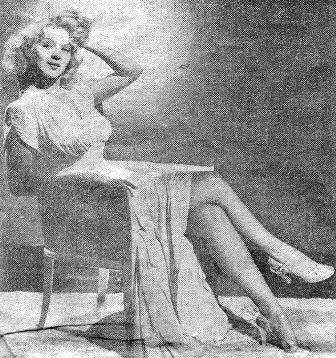 A certain brigadier general was up here the other day and expressed the opinion that Roundup's cheesecake
was falling off in sex appeal. Although we ordinarily don't bow our necks so meekly to brigs we wonder if the shot of
Paramount's Martha O'Driscoll above will correct the deficiency.
A certain brigadier general was up here the other day and expressed the opinion that Roundup's cheesecake
was falling off in sex appeal. Although we ordinarily don't bow our necks so meekly to brigs we wonder if the shot of
Paramount's Martha O'Driscoll above will correct the deficiency.
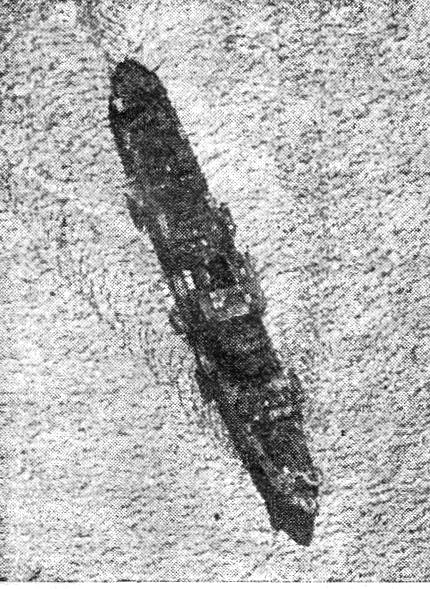
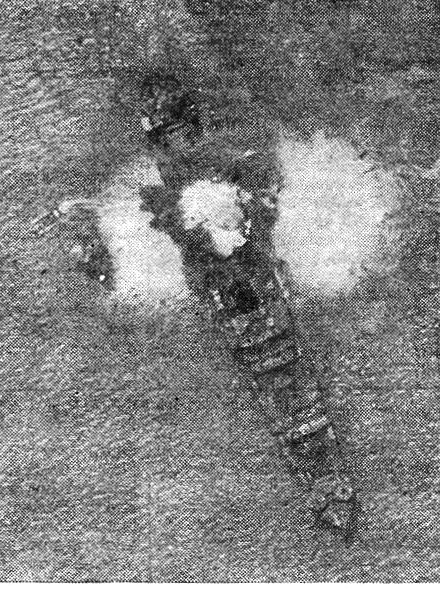 A 7,000-ton Japanese merchant vessel (left) is spotted by India Air Task Force bombers near Rangoon, armed fore and
aft with anti-aircraft guns. The same ship (right) is seen being struck by bombs. When last seen the ship was afire
and is believed to have sunk. Anti-aircraft guns fired no more after first bomb hit.
A 7,000-ton Japanese merchant vessel (left) is spotted by India Air Task Force bombers near Rangoon, armed fore and
aft with anti-aircraft guns. The same ship (right) is seen being struck by bombs. When last seen the ship was afire
and is believed to have sunk. Anti-aircraft guns fired no more after first bomb hit.
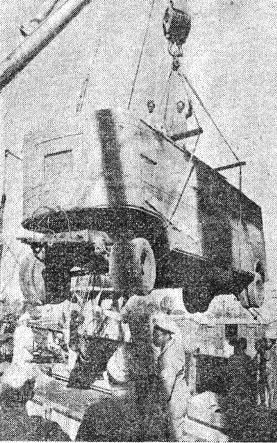
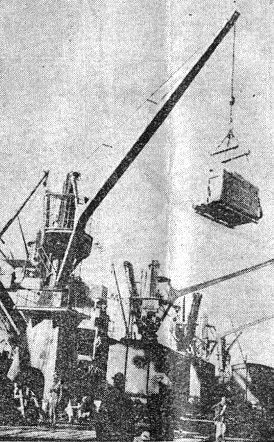 An Indian port is the scene of considerable activity as supplies and equipment arrive by sea and are reshipped to
various distribution points. Left: A huge truck trailer is loaded for reshipping. Right: Hydraulic cranes transfer
cargo from ships to waiting rail cars.
An Indian port is the scene of considerable activity as supplies and equipment arrive by sea and are reshipped to
various distribution points. Left: A huge truck trailer is loaded for reshipping. Right: Hydraulic cranes transfer
cargo from ships to waiting rail cars.
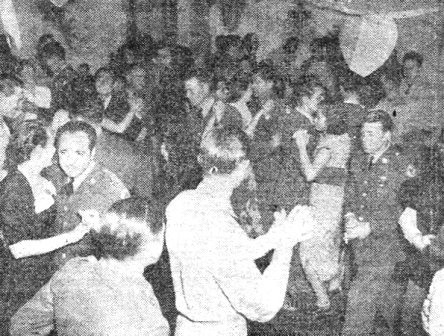 Enlisted men of the China Air Task Force take time out from their war chores to dance to portable phonograph music
near their base in China.
Enlisted men of the China Air Task Force take time out from their war chores to dance to portable phonograph music
near their base in China.
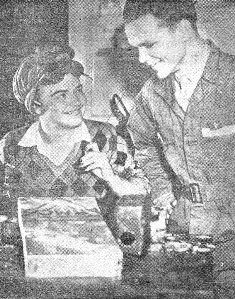 Miss Zoe Chennault, a welder for the U.S. Army Air Forces' technical training command, gets some pointers from her
cousin, Pvt. Charles L. Chennault, an instructor in an aviation mechanics school. He is the son of Brig. Gen. Claire
Chennault, chief of the China Air Task Force.
Miss Zoe Chennault, a welder for the U.S. Army Air Forces' technical training command, gets some pointers from her
cousin, Pvt. Charles L. Chennault, an instructor in an aviation mechanics school. He is the son of Brig. Gen. Claire
Chennault, chief of the China Air Task Force.
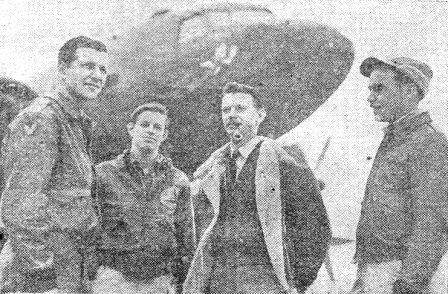 Capt. Albert Nowak, Sgt. J. F. Gannon, Lt. William Gartman and Sgt. George R. Saylor (from left to right) after their
successful crash landing.
Capt. Albert Nowak, Sgt. J. F. Gannon, Lt. William Gartman and Sgt. George R. Saylor (from left to right) after their
successful crash landing.
